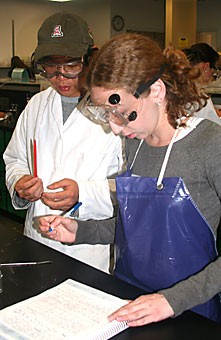While many UA students may complain about not being able to understand their international teaching assistants, these TAs must pass tests that show they have the English-speaking ability necessary to be effective in the classroom.
Communicating in the classroom is not always a matter of spoken words and accents. Subtleties such as body language and slang can also be difficult, said Tina Deemer, academic programs coordinator for the mathematics department.
“”A lot of times there are cultural things that people need to address as well,”” Deemer said.
In addition to a spoken English test, the Test of English as a Foreign Language, or TOEFL, is designed to ensure that international TAs are comfortable with English, according to the University Teaching Center Web site.
The tests assess the English language abilities of applicants in a number of ways.
The TOEFL measures the English reading, listening, speaking and writing abilities in secondary speakers of the language for the Educational Testing Service, the organization that administers the test. The Test of Spoken English (TSE) and the SPEAK tests assess the ability of international teaching assistants to communicate in English.
Those who do not score well on the TSE must complete the UA course graduate college 697d, which teaches international TAs techniques to transition to an American classroom, and can be substituted for the spoken English test.
The mathematics department at the UA relies on the requirements set by the university when hiring a graduate teaching assistant.
“”There are people here on campus whose job is to assess all the graduate students,”” Deemer said.””We rely on them to make those judgments.””
Anthony Fernandes, a graduate teaching assistant in the mathematics department from Calcutta, India, said he does not have trouble communicating in the classroom. Even though he grew up speaking English at school and at home, he was still required to pass the tests.
There are approximately 16 international graduate teaching assistants in the mathematics department, said Sandra Sutton, graduate coordinator in the mathematics department.
In the chemistry department, approximately 25 percent of teaching assistants are international graduate students.
Anne Padias, director of academic services for the chemistry department, said the international teaching assistants are contacted by telephone in their home country before they arrive on campus.
“”We call them and talk to them on the phone wherever they may be,”” Padias said. “”We make sure they can actually have a conversation with us over the phone.””
The chemistry department international teaching assistants are also asked to arrive on campus one week before other TAs in order to familiarize themselves with the UA. All then go through a two-week orientation on teaching styles and methods. Finally, all TAs must give a presentation before a panel, Padias said.
Additionally, a mentor, who is usually a fellow graduate student with teaching experience, can be assigned to aid each international TA in the classroom.
“”Our system really works,”” Padias said. “”The ITAs have to be able to teach.””
Jacqueline Garrick, a veterinary science freshman, said she understands her international teaching assistants.
“”They have pretty good spoken English,”” Garrick said.
Victoria Duckworth, a biology freshman, said although she has trouble understanding her international TA, she finds ways to bridge the communication gap.
“”I usually try to work it out,”” Duckworth said. “”He’s pretty good at writing on the board.””









